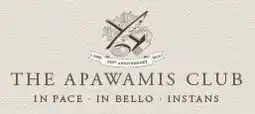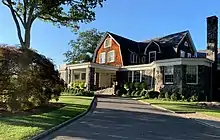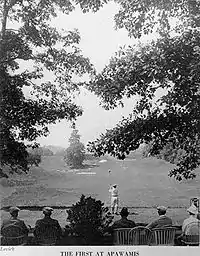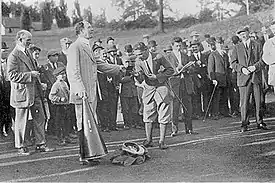The Apawamis Club
The Apawamis Club is a private country club located in Rye, New York, Westchester County, long known for its 18-hole golf course and prominence in the sport of squash.[1][2] The 1911 U.S. Amateur Championship was contested here, resulting in a playoff between the reigning British Amateur champion, Harold Hilton, and his lesser-known American opponent, Fred Herreshoff. Apawamis is also the home base of a nationally recognized junior squash program and hosts the world renowned Briggs Cup tournament.[3][4]
 | |
| Club information | |
|---|---|
 Location in the United States | |
| Coordinates | 40°59′16″N 73°41′33″W |
| Location | Rye, New York United States |
| Established | 1890 |
| Type | Private |
| Total holes | 18 |
| Tournaments hosted | 1911 U.S. Amateur |
| Website | The Apawamis Club |
| Designed by | Tom Bendelow, Maturin Ballou, Willie Dunn, Jr., Herbert Strong, Gil Hanse, Keith Foster |
| Par | 72 |
| Length | 6,741 yd (6,164 m) Longest hole is #9 - 600 yd (550 m) |
Club Founding and History

The Apawamis Club was originally founded on June 25, 1890 as a social organization by a group of 40 gentlemen from Rye and the surrounding towns. Their shared goal was “to improve both the physical and moral tone of the village”.[5][6] The club was named after an area in Rye dubbed Apawamis by the Native Americans. The name is derived from the words "appoqua" which means “to cover” and "mis" meaning “the trunk of a tree” – together the name implies “the covering tree”.
Located in a residential area of Rye between Club Road and Highland Road, Apawamis abuts two historic neighborhoods. Its property boasts two significant National Register eligible structures. The current Apawamis clubhouse was completed in 1908, and built of stone, replacing a previous wooden structure consumed by fire in February 1907.[7] The structure was designed by Frank A. Moore and the cornerstone was laid sometime after Thanksgiving 1907. The Apawamis "Manager's House" was built in 1895.[8]
Golf Course Design History
Apawamis' transition from a social club to a highly respected golf club took off in 1899. The club started out with a nine hole course on Boston Post Road. After two or so years of popular use of the course, the officers of the club were faced with a challenge – the cost of renewing their lease was deemed too high and demand to play the sport showed no signs of ebbing. As a result, in February 1899, members announced that they would purchase 120 acres of the former Charles Park estate (the Park family were Apawamis members) close to the Rye train station to create the venue that exists today. That same year saw the golf course laid out and the first access roads created. Membership which was at this time 300 members was anticipated to expand to 1,000 members. It was also decided that a new clubhouse based on the structure at the Atlantic City Country Club would be erected after the golf course was finished. Costs for the entire project, buildings and greens, were estimated at $100,000.[9]
The course opened informally to great acclaim on May 13, 1899 in an 18-hole match against Westchester Country Club. The Captain of the Apawamis Golf Club team was Herbert A. Sherman and other players on the winning team included Maturin Ballou, Victor Delano, S. W. Doubleday, R.F. Mathews and Roger Samson.[10][11] The clubhouse itself opened on October 7, 1899 with 700 members and guests in attendance.
Over the last 120 years, many notable golf course architects, club pros and amateurs have left their signature on the Apawamis golf links:
Tom Bendelow
The original 18-hole course at Apawamis was first laid out by Scottish architect Tom Bendelow and largely completed by May 13, 1899.[12][13][14][15] Bendelow, who has been called the "Dean of American Golf",[16] had recently designed New York City's public course at Van Cortlandt Park and had been hired as the superintendent of the site.[17][18][19]
Later in August 1899, newspapers shared "glowing accounts" about the design's "undulating nature" and told readers that ""Tom" Bendelow is now busily engaged putting on the finishing touches to it."[20] The natural contours of the well-tended pasture land spoke to Bendelow's aesthetic philosophy and also helped expedite installation of the greens and holes. Bendelow took advantage of two existing brooks and a pond on the Park Estate to create water hazards. Three of the holes were made to be over 500 yards and the ninth hole, the longest, came in at 580 yards. With a total length of 6,280 yards, Bendelow's design instantly made the new Apawamis course one of the longest in the country at the time and a must play destination later lauded by Bendelow's friend and world champion Harry Vardon. The length of each original hole was as follows: IN 240, 350, 120, 380, 520, 350, 420, 200, 580 OUT 460, 390, 300, 275, 565, 240, 160, 330, 400.[19] The course was instantly acclaimed as championship caliber and compared favorably for being "as nearly as long as old St. Andrews and longer than Hoylake, Sandwich, and Muirfield." [18]
At least six of Bendelow's courses have since been recognized by the United States Department of the Interior and added to the National Register of Historic Places. In fact, Bendelow's design for City Park Golf Course, Baton Rouge, Louisiana, was the first golf course awarded such an honor in the history of the National Park Service.[21][22][23]
Maturin Ballou
In November 1899, Maturin Ballou, an Apawamis Club member and player on the golf team, oversaw the installation of a new drainage system.[24] Some refinements of Bendelow's course are said to have then taken place at the suggestion of Willie Dunn, Jr. in collaboration with Ballou..
Ballou had the opportunity to show off his handiwork the following year to Harry Vardon on November 6, 1900, in a best ball exhibition match with the then Apawamis pro Willie Davis.[25] After playing, Vardon announced that Apawamis was one of the three best courses he had seen in the country after Newport and Atlantic City.
Ballou eventually became USGA secretary from 1902-1903 as well as the president of Apawamis. In 1910, he was given a rare honorary membership at Apawamis in recognition that he was "instrumental in bringing the club links up to their ... excellent condition." [26]
William "Willie" Davis
William "Willie" Davis was one of Apawamis' earliest resident pros. He received an offer to join the club sometime in the fall of 1899.[27] He had laid out the first short course at Shinnecock Hills, Long Island in 1891 and in 1892 planned the links at Newport Golf Club where he became resident professional. But Davis left Newport after a difference of opinion with the club. Once at Apawamis, by September 1901, Davis had further refined the links that Bendelow had originally planned.[28]
At the time of his untimely death at age 39, Davis was credited as being the oldest resident golf professional in the United States and the first to have come to America to make a living as a golfer. He died in 1902 from pneumonia.[29][30]
Thomas Chisolm
Chisolm, a British golfer from a course near old Rye, England was hired in April 1902 by Apawamis to take Davis' role for one season before being replaced by Willie Anderson.
Willie Anderson
Apawamis was the home course for golfing great Willie Anderson for three seasons from 1903 through 1905.[31] His 1901 US Open victory made Anderson much sought after by clubs including Baltusrol Golf Club where he applied. Weighing his choices, on March 23, 1903, he ultimately signed a contract with Apawamis. Anderson remains the only golfer to win three consecutive US Opens.
In November 1905, Anderson signed with the Onwentsia Club in Chicago to be their pro for the 1906 season [32] but only stayed one season. Moving from club to club, he died suddenly in 1910 of hardening of the arteries; he was only 31. Herbert Strong was hired as the head professional to take his place at Apawamis.
Herbert Strong
Strong made changes to the Apawamis golf course, which included adding bunkers, between 1906 and 1911 in preparation for the 1911 U.S. Amateur.
Golf Facts
On February 28, 1901, Apawamis officially joined the USGA with Golf Chairman Maturin Ballou acting as delegate.
Women have always played a significant role in the golf culture of the club so much so that in 1899, the construction of an additional 9-hole course just for women was contemplated but never realized. While not originally considered Active Members, they were placed in a category called Associate Members and had access to the links.
The course's most visually distinctive hole is #4, dubbed "Eleanor's Teeth" after First Lady Eleanor Roosevelt.
The Green Meadow Golf Club was an offshoot of Apawamis and formed in 1917 directly adjacent to Apawamis but with frontage on North Street. In fact, in 1927 the two clubs considered consolidating.[34] The course was designed by Devereux Emmet.[35] Today, the former Green Meadow Golf Club is known as Willow Ridge Country Club.
Golf Tournaments at Apawamis Club

Apawamis has historically boasted strong fields in tournament play for both men and women. Women and men have also played each other on the links including a notable 1902 match with national champion Genevieve Hecker leading the women's team.[36]
- 1903-1905 Women's Metropolitan Golf Association Championship[37][38][39][40][41]
(Winner: Caroline Fraser Manice) - Julian Curtiss Cup[42] match, a series held exclusively between clubs that are more than 100 years old
- 1909 NCAA Yale vs. Princeton
(Winner: Princeton) - 1911 U.S. Amateur

The 1911 U.S. Amateur Championship was contested at Apawamis Club in 1911, resulting in a playoff between the reigning British Amateur champion, Harold Hilton, and his lesser-known American opponent, Fred Herreshoff. The field was laden with a number of fine players, such as Francis Ouimet and Walter Travis, but they could not keep pace with Hilton and Herreshoff. Ouimet would later win the U.S Open in 1913 at The Country Club in Brookline, Massachusetts.
Herreshoff defeated Chick Evans in the semi-finals. He was trailing Hilton by six holes in the final match but managed to mount a stunning comeback to tie the match and send it to a playoff. On the 37th hole of the match, Hilton sliced his approach shot badly but instead of finding the deep rough right of the green his ball ricocheted off a flat rock and luckily landed on the green. Herreshoff, meanwhile, topped his approach shot to a position short of the green. His pitch shot to the par 4 hole went 20 feet past the pin. Hilton two-putted for par while Herreshoff was unable to make his 20-foot putt to save par. Hilton was declared the winner and was awarded the Havemeyer Cup, a trophy given to the USGA by golf enthusiast and millionaire sugar dealer Theodore Havemeyer.[43] Havemeyer, who died in 1897, served as the first president of the USGA.
- 1912 Metropolitan Open
(Winner: Tom McNamara) [44] † - 1928 NCAA Princeton vs. Georgetown
(Winner: Princeton) - 1952 The PGA Westchester Classic had its beginnings at Apawamis as a one-day pro-amateur benefiting the now defunct United Hospital of Port Chester. It was the precursor of the Thunderbird Classic and later moved to Westchester Country Club.
- 1970 U.S. Girls' Junior
(Winner: Hollis Stacy) [45] - 1978 Curtis Cup
- 2005 U.S. Senior Women's Amateur
(Winner: Diane Lang)[46]
Squash
In 1904, Apawamis built one of the first squash houses in the country demonstrating its early commitment to this winter sport.[47] As a result, the club's squash program now stands as the third oldest in the US.[48] Apawamis was one of the 25 founding clubs of the National Squash Tennis Association in 1911 and an Apawamis member, Dr. Alfred Stillman, was the first and second winner of the NSTA championship in 1911.[49][50] Successive expansions of the squash facilities were endorsed by members in 1929 making the facilities the most modern in the country[51] and again in 1938 at which time the building offered two regulation singles courts and one doubles court.[52] Famous women players of the sport at that time included Agnes Lamme, 3 time winner of the Metropolitan Squash Racquets Championship [53] and a winner of the National Doubles Championship with her partner and future Squash Hall of Famer Ann Page.[54]
More than 115 years later, Apawamis squash instructors regularly train nationally ranked male and female students. Many of its junior players have gone on to compete at or become captains of numerous top collegiate teams including Harvard, Stanford, Yale, Princeton, Amherst College, Williams College, Hamilton College and University of Virginia.[55] The squash facilities were most recently updated in the 2000s.
In addition to singles squash, Apawamis is home to the competitive biennial Briggs Doubles Cup named for the club's longtime Director of Squash and US Squash Hall of Famer, Peter Briggs.[56][57][58][59] The Briggs Cup is the largest doubles tournament in the world and benefits disadvantaged youth through the CitySquash charity.[60] It has attracted #1 world ranked Professional Squash Association players like Nicol David, Amanda Sobhy[61] and Natalie Grainger. The #1 Men's Double Champions in the world Damien Mudge and Manek Mathur have also played regularly at Apawamis.[57]
Tennis and Paddle Tennis
In addition to golf and squash and other amenities offered for members and guests, the club has tennis and paddle tennis courts.[62] Members participate in local inter-club competitions.
Beach Club
On July 14, 1934 Apawamis inaugurated a Beach Club on Milton Point, at the intersection of Forest Avenue and Van Wagenen Place, which survived through the 1960s.[63]
Famous People, Members and Events
One of Apawamis' most famous players was Genevieve Hecker. She won the Women's National Golf Tournament back to back in 1901 at Baltusrol and in 1902 at Brookline.[64] Hecker was acknowledged for skills on the links that surpassed those of many men "Miss Hecker as far, as her iron play is concerned has no superior in this country among women and few men can compete with her in this part of the same. She is thoroughly worthy of the title of champion." [65]
Golf great Gene Sarazen and entertainer Ed Sullivan were both caddies at Apawamis.
On January 6, 1945, after being married at the First Presbyterian Church in Rye, New York, future U.S. President George H. W. Bush and his wife Barbara held their wedding reception at the Club.[66]
Wildlife photographer Bayard W. Read and his wife Edith were members. Edith Gwynne Read was a noted conservationist who protected Rye wetlands and watercourses from the negative impacts of overdevelopment and whose legacy is embodied in the Edith Read Sanctuary, Rye, New York.[67] Bayard, a financier and graduate of Princeton, was president of Apawamis in 1940 at the time of the club's 50th anniversary.
Other famous members include Junius Spencer Morgan and Andrew Carnegie.
References
- "Country Club Sport". The Sun. New York, New York. March 30, 1912.
- "Golf--Pool--Squash". The Rye Chronicle. New York, New York. March 7, 1914.
- "Dinerman, Rob - A History of Squash at Apawamis". dailysquashreport.com. Retrieved February 20, 2015.
- "Briggs Cup". WSDA Pro Tour. Retrieved September 19, 2019.
- "Club History - The Apawamis Club". apawamis.org. Retrieved February 20, 2015.
- Clary, Suzanne,"Sailing and Tennis and Golf Clubs, Oh Rye!", Rye Magazine, Weston Publishing, (July 2015)
- "APAWAMIS CLUB HOUSE BURNS, Home of Golfers at Rye is Destroyed By Fire; Loss Is 130,000". The New York Press. February 5, 1907.
- "105 Highland Road, Rye". RedFin. Retrieved September 14, 2019.
- "Apawamis Club Branching Out". New York Daily Tribune. New York, New York. February 27, 1899.
- "Golf. Today's Matches On Local Links". New-York Daily Tribune. New York, New York. May 13, 1899.
- "Apawamis Team Victorious". New-York Tribune. New York, New York. May 14, 1899.
- "Golf". The Sun. New York, New York. April 21, 1899.
- "CRICKET CLUB GOLF SCHEDULE. Arrangements for the season on the Fox Hill Links — Notes from Various Courses". The Evening Post. New York. May 9, 1899.
- "The new eighteen-hole course of the Apawamis Club". The Port Chester Journal. New York, New York. May 11, 1899.
- "Ideal Apawamis Links". Democrat and Chronicle. Rochester, New York. September 16, 1901.
- "Highlights of Tom Bendelow's Golf Career" (PDF). Montclair State University. Retrieved October 26, 2019.
- "Pioneer Tom Bendelow". The Cultural Landscape Foundation. Retrieved September 16, 2019.
- "Golf Gossip". The Sun. New York. April 30, 1899.
- "New Golf Course for Millionaires. Apawamis Club to Have Fine Links at Rye-on-Sound.Also a New Club House to Cost Fifty Thousand Dollars—Many Natural Advantages". The New York Press. New York. May 4, 1899.
- "New Golf Courses Near New York. Full Eighteen Hole Links to Open This Fall at Tuxedo, Rye and Elsewhere. Apawamis' Fine Stretch". New York Herald. New York. August 29, 1899.
- "Vineyard: An Occasional Record of the National Park Service, Volume 6". NPS. 2005. p. 6. Cite magazine requires
|magazine=(help) - "Temple Terrace Golf Course". NPS. Retrieved October 26, 2019.
- "Wing Park Golf Course". Historic Elgin. Retrieved October 26, 2019.
- "Golf - Midwinter Doings Among the Local Clubs". New York Tribune. New York, New York. January 29, 1900.
- "Sports and Sportsmen. Golf". The Rye Chronicle. New York. November 5, 1900. p. 12.
- "Personal and Social". The New-York Daily Tribune. New York. February 18, 1911. p. 12.
- "Golf". New York Daily Tribune. New York, New York. November 10, 1899.
- "GOLF AT APAWAMIS". The New-York Daily Tribune. New York, New York. September 15, 1901.
- "A Pioneer Golfer's Death". The Sun. New York, New York. January 10, 1902.
- "Golf. Willie Weir and His Early Contemporaries". The Sun. New York, New York. November 14, 1910.
- "The Chicago Daily News Almanac: For Harvard College". The Chicago Daily News. 1918. Retrieved 6 April 2015.
- "Star Golfer for Onwentsia Club". Chicago Tribune. Chicago, Illinois. November 30, 1905.
- "Master List of Herbert Strong Golf Courses". golfclubatlas.com. Retrieved February 21, 2015.
- "APAWAMIS AND GREEN MEADOW COUNTRY CLUBS MAY CONSOLIDATE". The Rye Chronicle. Rye, New York, New York. March 6, 1918.
- "Hughes Apawamis Professional, Will go to Green Meadow". The Evening Tribune. New York, New York. March 6, 1918.
- "Miss Hecker at Apawamis". The New York Herald. New York. May 23, 1902.
- "Mrs. Manice is Champion". The New York Times. June 15, 1902. p. 7 – via ProQuest.
- "Mrs. Manice is Champion". The New York Times. June 19, 1904. p. 9 – via ProQuest.
- "Tee Shots". Golf Illustrated. 17: 24. July 10, 1903.
- "Sporting Records: Golf". Brooklyn Daily Eagle Almanac: 190. 1905.
- "Golf". Collier's Self-Indexing Annual. 1905. p. 676. Retrieved July 8, 2019.
- "Message from the President" (PDF). Apawamis Now. Apawamis Club: 2. Fall 2012.
- "Hilton Is Golf Champion; Match Goes Extra Holes". The Washington Post. September 17, 1911. Retrieved February 21, 2015.
- "Tom McNamara Wins Metropolitan Championship". Fitchburg Daily Sentinel. July 12, 1912. Retrieved February 22, 2015.
- "Hollis Stacy wins 1970 US Junior Girls' Amateur at Apawamis Club". usga.org. Archived from the original on May 12, 2011. Retrieved February 21, 2015.
- "Diane Lang wins 2005 U.S. Senior Women's Amateur at Apawamis Club". usga.org. Retrieved February 21, 2015.
- "Apawamis Club Squash Racquets House". The Rye Chronicle. September 6, 1940.
- "Job Posting for Director of Junior Squash" (PDF). Apawamis Club. Retrieved September 14, 2019.
- "Columbia Alumni News". Columbia University. May 11, 1911.
- "Fast Squash Team - Apawamis Club Has a Quintet Training That Ought to Hang up a Record This Year". The Rye Chronicle. November 22, 1913.
- "Apawamis Club". The Rye Chronicle. January 12, 1929.
- "Exhibitions Given at Opening of Apawamis Squash House, Country's Best Squash Players Help Dedicate New Building Before Capacity Gallery". The Rye Chronicle. December 16, 1938.
- "Mrs. Ary Lamme Wins Squash Racquets Title Third-Time". The Rye Chronicle. January 13, 1939.
- "Hall of Fame". US Squash. Retrieved November 30, 2019.
- Irena Choi Stern. "SPORTS; A County Of Squash, And Talent Homegrown". New York Times. Retrieved September 15, 2019.
- Tom McDermott. "Peter Briggs, An Untarnished Legend". Rye Record. Retrieved September 14, 2019.
- "MATHUR & MUDGE SURGE TO LIFT BIENNIAL BRIGGS CUP". SDA Pro Tour. Retrieved September 15, 2019.
- Rob Dinerman. "A History Of Squash At Apawamis: An Ongoing Tradition Of Excellence". DailySquashReport.com.
- "SQUASH MAGAZINE 2015 TOP FIFTY ANNOUNCED". Retrieved September 15, 2019.
- "2015 Briggs Cup Comes to a Close". CitySquash. Retrieved September 15, 2019.
- "Sobhy Makes Triumphant Return in Briggs Cup". US SQUASH. Retrieved September 15, 2019.
- "Byrne, Jim - Rye on the Ball". wordpress.com. Retrieved February 20, 2015.
- "Apawamis Club Opens Beach House Saturday for Season". The Rye Chronicle. June 10, 1938.
- "MISS HECKER WINS GOLF CHAMPIONSHIP AGAIN, Apawamis Player Defeats Miss Wells of Boston by 4 Up in Finals at Brookline". The World, Saturday Evening. New York. October 4, 1902.
- "MISS HECKER IS WINNER. APAWAMIS PLAYER AGAIN CAPTURES WOMAN CHAMPIONSHIP". The Chicago Sunday Tribune. October 5, 1902.
- "Barbara Bush, former First Lady, fondly remembered her Rye hometown". Lohud.com. Retrieved May 3, 2018.
- Paul Hicks. "Edith Read, Rye's Environmental Visionary". Rye Record. Retrieved September 29, 2019.
Notes
† Former Apawamis Club head professional Herbert Strong, who in 1912 was playing out of Inwood Country Club, placed third in this event.
